Passover: Read Thoughtfully
Long before The Holocaust, Samuel Clemens (a.k.a. Mark Twain) urged readers to consider the Passover story’s backstory – the enslavement of Egyptians that preceded the enslavement of Jews. He used the word ‘corner’ in the following paragraph to mean ‘control’ – as in to ‘corner’ a market:
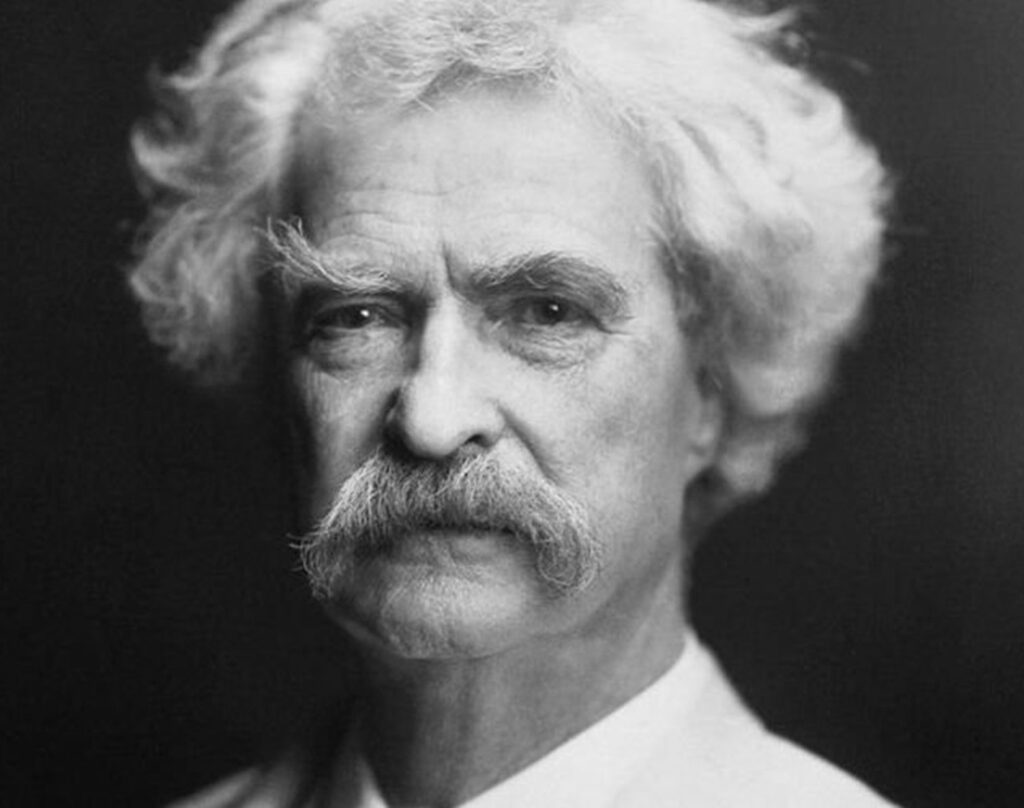
“We have all thoughtfully — or unthoughtfully — read the pathetic story of the years of plenty and the years of famine in Egypt, and how Joseph, with that opportunity, made a corner in broken hearts, and the crusts of the poor, and human liberty — a corner whereby he took a nation’s money all away, to the last penny; took a nation’s livestock all away, to the last hoof; took a nation’s land away, to the last acre; then took the nation itself, buying it for bread, man by man, woman by woman, child by child, till all were slaves; a corner which took everything, left nothing; a corner so stupendous that, by comparison with it, the most gigantic corners in subsequent history are but baby things, for it dealt in hundreds of millions of bushels, and its profits were reckonable by hundreds of millions of dollars …” – Samuel Clemens (aka Mark Twain)
Read thoughtfully, Clemens’ 1899 essay warrants more consideration than a knee-jerk judgment that he was anti-Semitic. Contemplating the entire essay clarifies that Clemens was more philosemitic than anti-Semitic.
Ancient nations were able to fabricate foundation myths out of whole cloth. There were no historical documents to contradict even their wildest fantasies. In distinction, newer nations are limited to embellishing and mythologizing their known historical development. Nevertheless, in both cases, commonly held myths serve a purpose. They give each believer a piece of self-image that can be recognized in compatriots. They make us feel related, even when we are only partial believers. By making family out of strangers, shared foundation myths grease the wheels of cooperation in pursuit of national objectives, foster in-group morality, and facilitate shared attitudes toward out-groups.
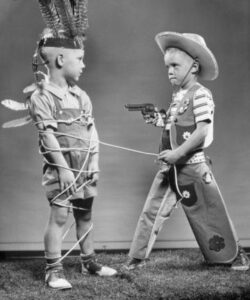
When ancient nations stop believing their own creation myths, like modern Greeks in reference to Zeus, we cannot gain much insight into their contemporary self-image by examining those myths. The same is true for people who have renounced previously revered components of mythologized history. For example, when I was a boy my companions and I believed that cowboys were very good Americans who were at their very best when they were killing Native Americans. When playing Cowboys & Indians, we took turns being Cowboys because nobody wanted to be an Indian — not just because Indians were slated to lose deadly battles, but because they were the bad guys. In that sense, it was just like playing Cops & Robbers.
Back then, we did not have a sense that we were the descendants of the robbers. So, although one could learn a great deal about 1950’s America by examining 1950’s myths, one cannot learn as much about 21st Century America by investigating myths that were rejected fifty years ago. Conversely, we can gain valuable insight into current cultures by examining their retained myths, even ancient whole-cloth myths, to the extent that those myths are still revered.
The purpose of this essay is to look at the original Passover myth in order to gain insight into its believers’ purposes.
The Myth of Jewish Slavery
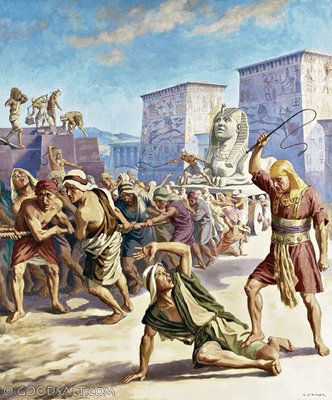
Seventy years of intense archeological research have failed to find credible evidence that the story of Joseph enslaving Egyptians is based, even loosely, on events that actually occurred. That absence of evidence is so conspicuous that it justifies the conclusion of every dispassionate pre-historian: the story was a whole-cloth fabrication. Only the most deeply indoctrinated 21 st Century Christians and Jews object to that conclusion.
In contrast, when Haaretz publishes an article based on the work of one of Israel’s most authoritative archaeologists, like Ze’ev Herzog or Israel Finkelstein, explaining that Israelites were never slaves in Egypt, a torrent of outrage is unleashed. Some letter-to-the-editor writers even draw analogies to Holocaust denial. Why such heartfelt anguish? Because even though both enslavement stories are told in The Bible, unlike the myth of Egyptian enslavement by Joseph, the myth of Jewish enslavement by a Pharaoh still serves cherished self-identity purposes for most Jews and for a much larger number of Christians. Given the vicissitudes of credibility granted to stories based on how they make us feel about our spiritual ancestors, and so about ourselves, Clemens should be forgiven for not having known that both enslavement stories are as fictional as The Adventures of Tom Sawyer and Huckleberry Finn.
According to The Bible, in exchange for a climate change forecast and important advice about planting and storing grain (Genesis 41:25-36), a son of Jacob (a.k.a. Israel) was given control of Egypt (Genesis 41:40-41):
“You shall be over my house, and all my people shall order themselves as you command; only as regards the throne will I be greater than you.” And Pharaoh said to Joseph, “Behold, I have set you over all the land of Egypt.”
The job came with substantial benefits and considerable status (Genesis 41:42-44):
Pharaoh took his signet ring from his hand and put it on Joseph’s hand, and arrayed him in garments of fine linen, and put a gold chain about his neck; and he made him to ride in his second chariot; and they cried before him, “Bow the knee!” Thus Pharaoh set Joseph over all the land of Egypt. Moreover Pharaoh said to Joseph, “I am Pharaoh, and without your consent no man shall lift up hand or foot in all the land of Egypt.”
So Joseph was made the executor of his own recommendation to enforce a double tithe: “take the fifth part of the produce of the land” (Genesis 41:34).
Harvests were so good during the first seven years of Joseph’s rule that he was able to stockpile “grain in great abundance, like the sand of the sea, until he ceased to measure it, for it could not be measured” (Genesis 41:49). Then came seven years of drought, and (Genesis 41:55-56):
When all the land of Egypt was famished, the people cried to Pharaoh for bread; and Pharaoh said to all the Egyptians, “Go to Joseph; what he says to you, do.” So when the famine had spread over all the land, Joseph opened all the storehouses, and sold to the Egyptians, for the famine was severe in the land of Egypt.
As often happens, control of wealth led to control of more wealth (Genesis 47:14-17):
And Joseph gathered up all the money that was found in the land of Egypt, for the grain which they bought; and Joseph brought the money into Pharaoh’s house. And when the money was all spent in the land of Egypt, all the Egyptians came to Joseph, and said, “Give us food; why should we die before your eyes? For our money is gone.” And Joseph answered, “Give your cattle, and I will give you food in exchange for your cattle, if your money is gone.” So they brought their cattle to Joseph; and Joseph gave them food in exchange for the horses, the flocks, the herds, and the asses: and he supplied them with food in exchange for all their cattle that year.
Now Joseph had cornered, to borrow Clemens’ term, all of the money, all of the cattle, and all of the grain. What was left? Only the people, so Joseph “made slaves of them” (Genesis 47:18-21):
They said to him, “We will not hide from my lord that our money is all spent; and the herds of cattle are my lord’s; there is nothing left in the sight of my lord but our bodies and our lands. Why should we die before your eyes, both we and our land? Buy us and our land for food, and we with our land will be slaves to Pharaoh” . . . So Joseph bought all the land of Egypt for Pharaoh; for all the Egyptians sold their fields, because the famine was severe upon them. The land became Pharaoh’s; and as for the people, he made slaves of them from one end of Egypt to the other.
After arranging the enslavement of the Pharaoh’s subjects, Joseph invited his family to join him. The Pharaoh was most obliging (Genesis 45:18; 47:6):
“Take your father and your households, and come to me, and I will give you the best of the land of Egypt, and you shall eat the fat of the land … The land of Egypt is before you; settle your father and your brothers in the best of the land.”
As discussed in the balance of Clemens’ essay, so began a sequence of events that presaged developments in the history of several Diaspora host nations. And as if foretelling two thousand years of anti-Semitism, the Passover story developed a new Pharaoh who realized that he was in danger of becoming the tool of his predecessor’s tool (Genesis 47:27; Exodus 1:7-10):
Israel dwelt in the land of Egypt and they gained possessions in it, and were fruitful … and grew exceedingly strong; Now there arose a new Pharaoh over Egypt, who did not know Joseph. And he said to his people, “Behold, the people of Israel are too many and too mighty for us. Come, let us deal shrewdly with them, lest they multiply, and, if war befall us, they join our enemies and fight against us.”
Where Things Get Familiar

Here the story becomes more familiar. The Pharaoh subjugated the Jews and oppressed them even more than his Egyptian subjects. And when the Jews’ new leader, Moses, tried to trick the Pharaoh into letting his people take a three day leave of absence with most of the nation’s wealth in tow (Exodus 3:18-22; 5:3), the Pharaoh said No! Then the God of the story, the God of Israel, sent horrible plagues to torture the Egyptians and the Pharaoh himself.
At several junctures the Pharaoh tried to make an accommodation with Moses, asking him to leave some wealth behind, but each time Moses refused (Exodus 8:25-28; 10:7-11, 24-26). And each time the God of the story “hardened” the Pharaoh’s otherwise amenable heart so that he, the God of Moses, would be able to show more of his power (Exodus 10:1-2):
Then the Lord said to Moses, “Go to Pharaoh; for I have hardened his heart and the heart of his officials, in order that I may show these signs and wonders of mine among them, and that you may tell your children and grandchildren how I have made sport of the Egyptians and what signs and wonders I have done among them — so that you may know that I am the Lord”
Finally, we come to the coup de grace that had been devised from the beginning by Moses and his invented-for-purpose God (Exodus 3:21-22 & 4:21-23 and Exodus 12:29-33, 35, 36):
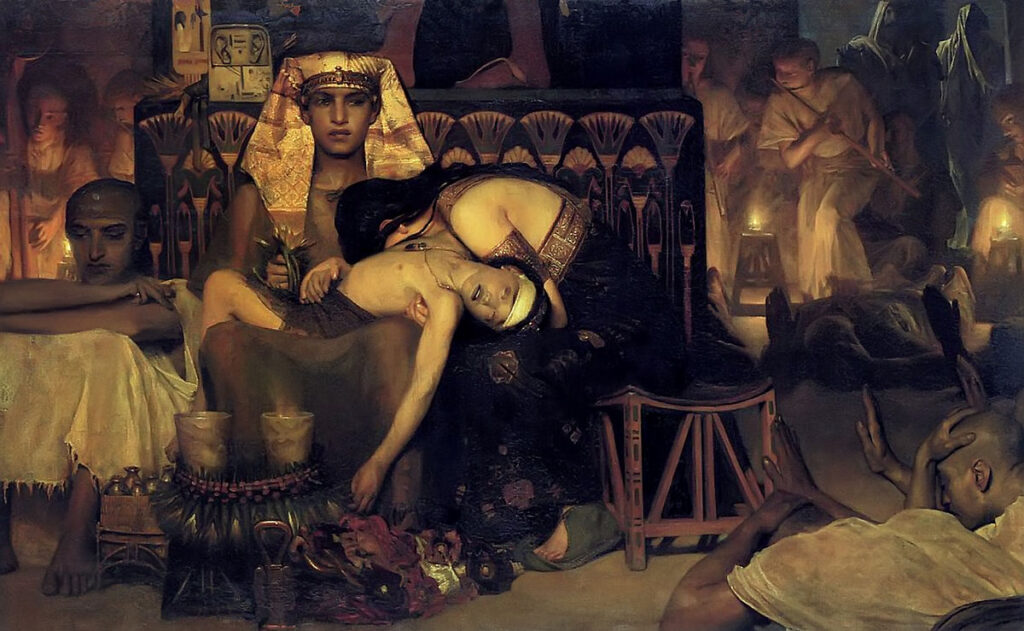
At midnight the Lord smote all the first-born in the land of Egypt, from the firstborn of Pharaoh who sat on his throne to the first-born of the captive who was in the dungeon . . . . And Pharaoh rose up in the night, he, and all his servants, and all the Egyptians; and there was a great cry in Egypt, for there was not a house where one was not dead. And he summoned Moses and Aaron by night, and said, “Rise up, go forth from among my people, both you and the people of Israel; and go, serve the Lord, as you have said. Take your flocks and your herds, as you have said, and be gone” . . . And the Egyptians were urgent with the people, to send them out of the land in haste; for they said, “We are all dead men” . . . The people of Israel had also done as Moses told them, for they had asked of the Egyptians jewellery of silver and of gold, and clothing; and the Lord had given the people favour in the sight of the Egyptians, so that they let them have what they asked. Thus they despoiled the Egyptians.
The Angel of Death passes over
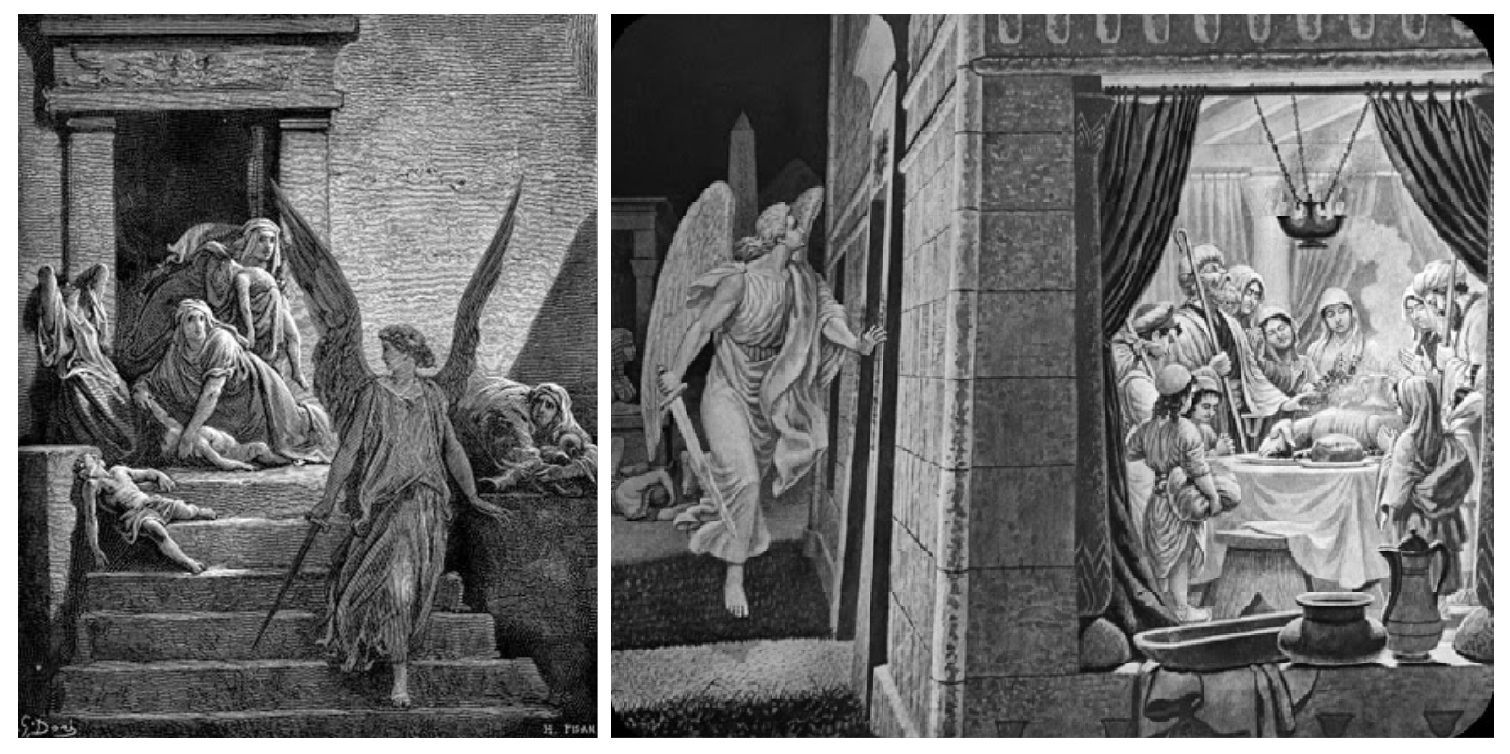
According to the myth, just as his forefather Abraham left Babylon-cum-Iraq to find greener pastures in Canaan-cum-Palestine, Jacob-cum-Israel’s family left Canaan to escape a famine and join their estranged son and brother, Joseph. They arrived in Egypt as impoverished and bedraggled guests of a Pharaoh (Genesis 47:26-27). Several generations later they left Egypt with a standing army of 603,550 men, “every man able to go forth to war” (Numbers 1:45-46). Logistical support included “very many cattle, both flocks and herds” (Exodus 12:38), and having gained the trust and respect of their Egyptian neighbors, financing included several thousand kilograms of “borrowed” gold and silver (Exodus 38:24-25). The Israelites were able to leave Egypt with so much wealth and power because their God “passed over” his people’s houses when he killed all firstborn Egyptian children on their behalf (Exodus 12:27). To this day, as instructed (Exodus 12:11-14), Judaism celebrates those fabled events as Passover, and most Christians, not just evangelicals, tip their hat in reverence and respect.
The express purpose of leaving Egypt, The Exodus, was to take “great and goodly cities, which you did not build, and houses full of all good things, which you did not fill, and cisterns hewn out, which you did not hew, and vineyards and olive trees, which you did not plant” (Deuteronomy 6:10-11) — not from people who were portrayed as the Israelites’ victims-turned-oppressors, not from a Pharaoh and his legions, but from an entirely separate people who had been living in Canaan-cum-Palestine long before Abraham left Iraq. Accomplishing all that God-authorized theft was to be facilitated by committing absolute genocide against prior owners (Deuteronomy 20:16-17):
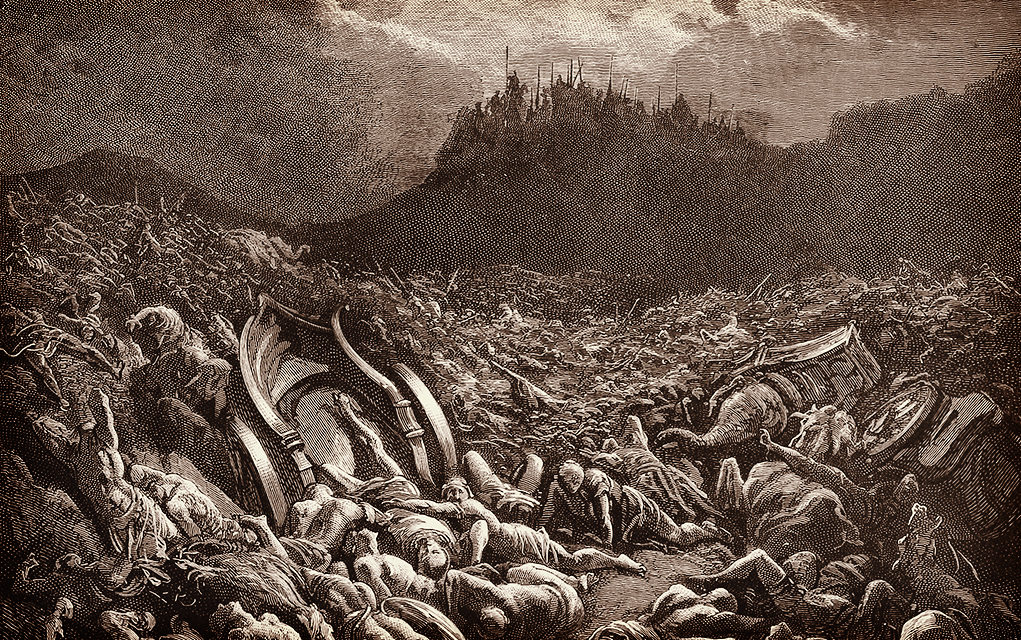
As for the cities of these peoples that the Lord your God is going to give you as an inheritance, you must not allow a single living thing to survive. Instead you must utterly annihilate them — the Hittites, Amorites, Canaanites, Perizzites, Hivites, and Jebusites [the people of Jerusalem].

It is easy to imagine the outrage that would be rightfully felt by people – Christians and Jews – who worship the God that Rabbi Jesus prayed to, if believers in some other religion reinvigorated their solidarity by annually celebrating a story that entails the killing of Christian and Jewish children as a “sport” of their God. So it would not be wokeness-run-amuck for Jews and Christians to eschew celebrating half of the Passover story – the half that details only Jewish suffering.

“Our majestic biblical heritage will be able to live, breathe, and flourish in modern times.” Trump
“You are recognizing Israel’s sovereignty over all the Jewish communities in Judea and Sumeria, large and small alike … as the distinguished pastors who are here know very well, these are places carved into the bedrock of our common civilization … these are places inscribed in the pages of the Bible.” Netanyahu
Unfortunately, reinvigorating solidarity by unthoughtful reading of the Passover myth strengthens the effort to make Palestinians pay for what yesterday’s Germans did to yesterday’s Jews. Mythological ill-gotten gain does not legitimize real ill-gotten gain.
The Holocaust adds a level of explanation, but it does not add a level of excuse.

